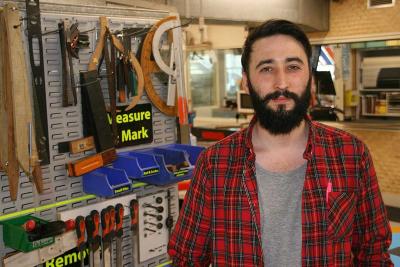Third-year student Patrick O’Connor used CAD (computer aided design) modelling to envisage safe but enjoyable playground equipment made almost entirely of recycled plastic as part of design research with Lower-Hutt based company Replas.
Designed for children aged five years to 12, he says the parts are “gestural, organic and fun."
Findings from a survey he conducted of 120 respondents showed familiar complaints about existing playground construction included that they lacked much variation and were overly cautious with their choice of equipment.
“I wanted to make something visually unique that went against the conventions of the traditional New Zealand playground. A large focus was also for climbing; survey respondents felt many playgrounds lacked verticality, or were too safe, so. I hoped to make structures that invite the user to scale without making an obvious ‘entry’ point,” he says.
“I also noted that in playground construction, materials such as wood and metal tended to wear and corrode over time while plastic components held up as well as the day they were made.”
The wonder of plastic is its durability, versatility and its ability to be broken down and remade into new objects with little introduction of raw material, he says.
“It’s quite a wonderful material if used properly and ethically.
“In this regard it beats what are considered more traditionally sustainable materials such as wood and metals that have to be replaced periodically. I believe it’s not necessary what a material is made of but rather how it’s applied that ultimately matters.”
His research is part of the ‘Unpacking Sustainability’ project offered to third-year industrial design students at Massey’s College of Creative Arts.
Senior lecturer Matthijs Siljee says the Australian/New Zealand recycling company Replas, which repurposes soft and hard plastics into products including road accessories such as bollards and also park furniture, challenged the design students to design a wider range of durable products to help drive the shift toward recycling plastic.
“I believe students need some experience with entrepreneurial activity and being on the factory floor, to prepare them for a successful career in design practice,” Mr Siljee says.
Managing director of Metal Art, the New Zealand licensed distributor and partner of Replas, Carl Longstaff, says once some of the students' work has reached beyond prototype stage and was ready for commercialisation, the company would be keen to work further with them or recommend another partner to progress the designs.
Another design student, Taylor Wickman, designed a 100 per cent recycled plastic cladding system that could be used as a substitute to traditional ceramic tiles in a variety of spaces such as bathrooms, gyms and pool areas. The design uses a clip system that allows the panels to be press fitted by hand into a machined substrate (the layer of a building between the wall and the façade) made from the same recycled material.
“From my research I found that people generally did not respect or enjoy some public spaces and hygiene and vandalism were common maintenance issues,” she says. “The modular design lends itself to easy installation and clip system means damaged panels can be easily removed, replaced and recycled again.”
She created 3D CAD models and physical prototypes demonstrating installation and in-context use of the system.
“The beauty of using recycled materials is that we are tapping into a resource that would otherwise end up in a landfill and giving it new life,” she says. “Recycled plastic fits this concept really well as it creates a surface that is highly durable, easy to clean, non-corrosive and recyclable at the end of its lifetime.
“I wanted to create something that has the potential to make a real difference in the way we consume resources,” she says.
Mr Siljee says the projects reflected the fact that industrial design is a mix between imagination and technical application. “As industrial designers we need to develop the skills to bring both these qualities together.”




